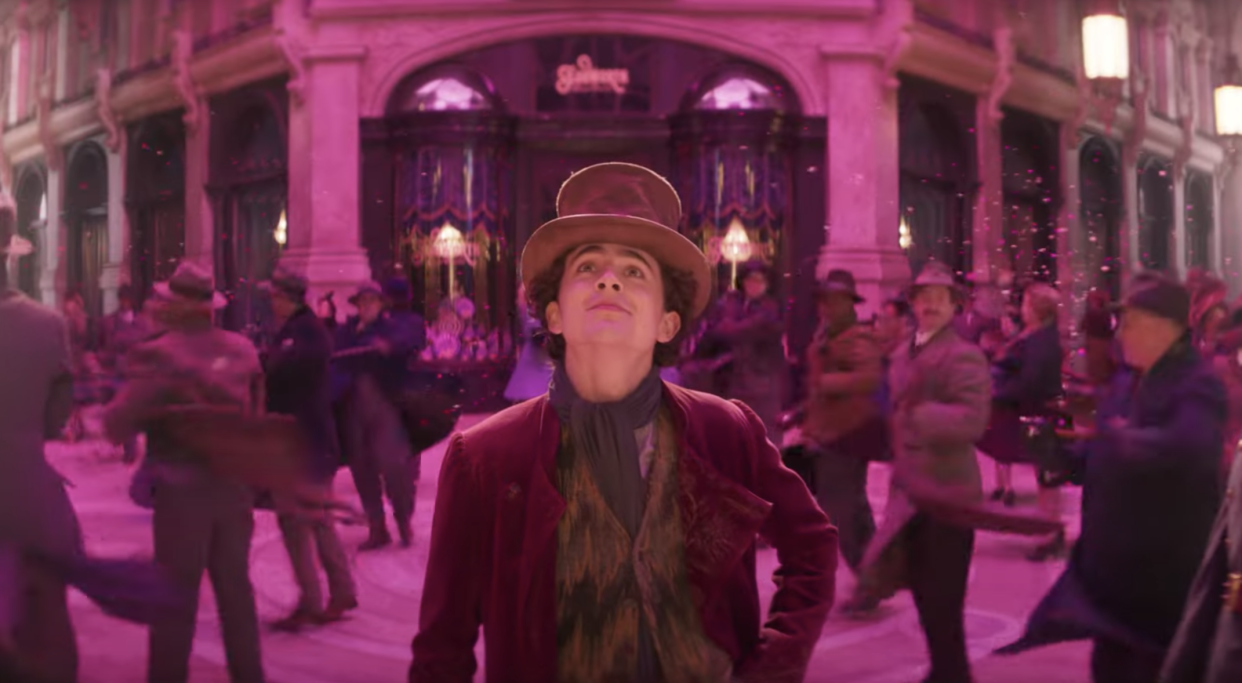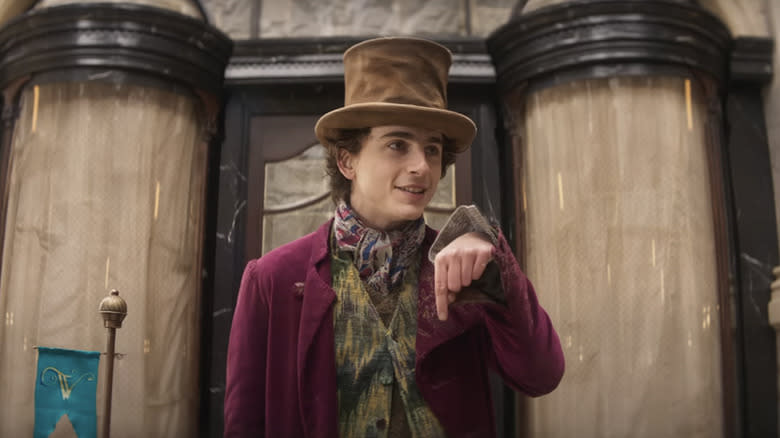‘Wonka’ Review: Cinema’s Most Demented Chocolatier Goes Full Paddington in Paul King’s Sweet and Spirited Holiday Delight


At the risk of overstating the political edge of a children’s story about an eccentric entrepreneur whose signature confections make customers float in the air before crapping live bugs out of their buttholes, there’s a delicious irony to the fact that Warner Bros.’ first big release since Discovery CEO David Zaslav (once again) canned a completed film in exchange for a $30 million tax write-off is an anti-capitalist fable set in a city run by a ruthless chocolate cartel who’ve diluted their own product in order to hoard the profits.
Of course, Hollywood is no stranger to the tastelessness of corporate hypocrisy, and Paul King’s big-hearted “Wonka” is hardly the first holiday film that’s tried to make some money by selling audiences on the magic of giving it away. And, sure, this musical take on modern fiction’s second-most frightening candyman might’ve been hard to stomach if it were just another “needy beat the greedy” tale about the warmth of kindness in a world that’s growing colder by the day.
More from IndieWire
“Wonka” definitely is that, don’t get me wrong; not even the first “Paddington” had quite this much “Paddington 2” energy. But if King’s ambitious follow-up to one of the greatest family movies ever made is much, much less demented than either of the previous attempts to bring Roald Dahl’s iconic chocolatier to the big screen, it’s also much — if only one “much” — richer than its gooey, frosting-dusted core might suggest.
Some of that simply boils down to the genius of King’s design, which suffuses every inch of his films with a sincerity that makes them special even when certain parts melt in your hands and not in your mouth. But if “Wonka” is a lot messier than either of its writer-director’s previous features, the reason it still feels like a holiday classic in the making is because the Scrooginess baked into its plot isn’t just lip service or something for its characters to overcome.
It goes without saying that greed causes cavities, and that the pathologically upbeat Wonka inevitably teaches everyone he meets that chocolate, like all good things in life, tastes much sweeter when it’s shared. But here, that familiar moral — as prevalent in our fiction as it is from our reality — is merely the pretext for a studio tentpole that isn’t afraid to put its money where its mouth is and take a sharper bite out of the hand that feeds it. More than just a sugary origin story about the power of love, “Wonka” is also a cautionary tale about what happens when a society entrusts its collective imagination to people who don’t have any of their own.
Money may not trickle down, but cynicism does. All the way down, down, down to the dingy hotel basement where a manboy inventor by the name of William Wonka (Timothée Chalamet) finds himself trapped for 10,000 days after he can’t afford to pay his bill for a single night. Equipped with nothing but a burgundy coat full of chocolate and a bottomless hat full of dreams, our high-cheekboned hero sails into King and Simon Farnaby’s script convinced that the world is as sweet as the candy he plans to sell back to it at a discount. It’s strange that he should still be so guileless after spending the last seven years traveling the globe in search of rare ingredients, but Willy is a bit too high on his own supply to see other people for what they are or read the room for information. In fact, he’s been so busy studying chocolate that he’s never learned how to read at all.
So when the innocent Mr. Wonka arrives in the nameless city where this movie takes place (a delectable mash-up of Dickensian London and Bavarian cream), he immediately announces himself as a perfect mark for its most unsavory characters. Characters like Olivia Colman’s Mrs. Scrubbit, a ghoulish innkeeper who seems to love human trafficking almost as much as she hates brushing her teeth; she and her oafish partner-in-crime Bleacher (Tom Davis) are as obviously sinister as any of the villains from Dahl’s stories, but Willy — so trusting, so unable to read the “standard” 80-page contract that guests at Scrubitt and Bleacher are forced to sign — soon finds himself trapped in the hotel’s laundry room along with the rest of the indentured servants.
Of course, even such a predatory debt would be easy for Willy to pay off if only he were able to sell his chocolates, but the city’s three chocolate tycoons don’t take kindly to competition (they’re played with scenery-chewing glee by Paterson Joseph, Matt Lucas, and Mathew Baynton). They depend on mass-produced crap to sustain their monopoly, and use the “good stuff” to bribe the sweet-toothed chief-of-police (Keegan-Michael Key) to arrest Willy whenever he dares to share his singular confections with the public. One taste of his caramel — salted with the bittersweet tears of a Russian clown — and it would be over for the criminals who run the Galeries Gourmet.
As Willy puts it in one of the half-dozen original songs that The Divine Comedy frontman Neil Hannon contributed to “Wonka” (all of them light and fun and stickier than toffee), “There’s chocolate, and there’s chocolate,” and even King’s least transcendent fantasia clearly falls into the latter category. Indeed, several of its most obvious shortcomings only add to the fake-it-till-you-make-it charm of a movie that often plays like a feature-length version of the “Rain on the Roof” number from “Paddington 2.”

Chief among those shortcomings would have to be Chalamet’s singing voice, a reedy instrument that sounds as magically enhanced as any of Willy’s confections, but makes up in high school theater-like enthusiasm what it lacks in Broadway-level tone. If “Wonka” is heightened enough to exist at the exact midpoint between the “The Grand Budapest Hotel” and “The Greatest Showman,” Chalamet’s raw excitability helps ground the movie in something real enough to keep it from floating away. There are moments in his performance that feel labored and inauthentic (most of them made worse by the groan-worthy patter of a part defined by its eccentricities), but Chalamet owns the uncoolness that comes with playing a kid-friendly version of a historically demented character. It works because Willy feels so close to who Chalamet really is at heart: A baby-faced goofball with the world at his feet.
If only this movie had a better idea of what to do with his character. “Wonka” is such a natural extension of “Paddington 2” that it can be hard to fathom why King was so determined to make this instead of “Paddington 3,” but the writer-director struggles to accommodate for the key differences in his source material. Both movies — or all three, if you bring the original “Paddington” into it — hinge on hyper-genuine outsiders whose innocence and enthusiasm inspires the best from the people around them, but where Paddington is a blank canvas who bumbles through the world like Chaplin’s Tramp or Monsieur Hulot, Willy Wonka is a visionary doer. One is a CGI spectacle, the other is an eternally pubescent P.T. Barnum.
King is drawn to ensemble, community-driven comedies that depend on the priceless vitality of their peripheral characters, and Paddington couldn’t have been a more perfect hub for the stories that King spun around him. Willy, on the other hand, isn’t nearly so passive; he’s a business mogul in the making, and his dreams — which themselves are vague at best, and in true “Paddington” style hinge on memories of Sally Hawkins as his long-dead mum — take up too much space to make room for anyone else’s.
His chocolates are good enough to make your eyes bug out of their sockelettes, but creating them under Scrubitt’s nose requires him to wrest control away from his fellow laundry-dwellers and new best friends. The youngest of them all is a little girl called Noodle (newcomer Calah Lane), and though her backstory ends up being crucial to the film’s emotional core, she can hardly speak without Willy shoving candy in her face and shouting about how they need to go milk a giraffe (Lane has a winningly disaffected screen presence that she uses to balance out her co-star’s exuberance, and it’s not her fault that “Wonka” strands her character with an unplayable emotional payoff).
The rest of the people stuck in Scrubitt’s basement are even more cramped, though King’s unparalleled eye for casting shines through all the same. As the erstwhile leader of the laundry brigade, “Downton Abbey” actor Jim Carter does a fine job of capturing the special flavor of King’s sweetness, while Natasha Rothwell, Rich Fulcher, and Rakhee Thakrar achieve a splendid harmony of the damned while singing along to the film’s most insidiously catchy earworm, “Scrub Scrub.”
The fun of that number — further enhanced by its clever but unfussy choreography — bleeds through the movie around it because of how beautifully Joby Talbot incorporates the music into his score. That seamlessness helps transform the movie’s Leavesden soundstages into a massive snow globe that comes to life whenever King gives it a hard shake; it’s no coincidence that “Wonka” peaks with a massive second-act sequence that spreads its attention across the entire city, and invites us to focus our attention more on the fondant-like beauty of Nathan Cowley’s set design or the immaculately piped trimmings of Lindy Hemming’s costumes than on any particular characters.
To that end, it’s telling that the movie’s smallest parts tend to leave its biggest impressions. And I’m not just talking about Hugh Grant’s curmudgeonly Oompa-Loompa, who casts a long shadow despite standing a foot tall and appearing in only a handful of scenes. Grant doesn’t give “Wonka” quite the same zest that he brought to “Paddington 2,” (as if anyone ever has before or could again), but his business-minded take on Wonka’s famous underling — disdainful of Willy, hilariously matter-of-fact about Oompa-Loompa traditions, and always dressed for the worst yacht club party of 1985 — makes the character an excellent foil for a film that can’t afford to feel saccharine.
And somehow, for all of its sugar, “Wonka” doesn’t. King’s hope for this film is the same as that which Willy infuses into his chocolates: To help people “see the faint ray of hope beyond the shadow of despair.” “Wonka” finds that hope by filtering those faint rays through a whimsical adventure that’s bursting with detail and delight even when some of its humor feels stale; much like its namesake, the movie can always fall back on its flair for invention, as it does by pivoting into a heist thriller during the home stretch.
But it’s the shadow of despair that “Wonka” traces most clearly; the cloud of disenchantment that can hover over every inch of our waking lives when the wrong people are allowed to monopolize our dreams. This may not be Paul King’s most satisfying film, but even at a scale — or at least a budget — several times larger than that of “Paddington 2,” the purity of its imagination remains unquestionable.
There are any number of kids’ movies that insist the future belongs to those who have the power to envision it for themselves, but few have drawn such a vivid line between the poverty of our dreams and the cravenness of the people running the dream factory. Fewer still have been made at a company whose CEO is so famous for devaluing the creative spirit; a CEO who, much like Mrs. Scrubbit, doesn’t seem to have noticed that several of the workers on his payroll were secretly cooking up a taste of real magic. Much like Mrs. Scrubitt, he stands to profit from their success all the same, but that’s okay, because we do too.
Grade: B+
Warner Bros. will release “Wonka” in theaters on Friday, December 15.
Best of IndieWire
Sign up for Indiewire's Newsletter. For the latest news, follow us on Facebook, Twitter, and Instagram.


